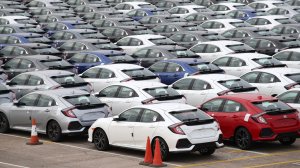5 Ways A Fall In Car Ownership Will Affect The Industry
How will car pooling and driverless vehicles impact the future of the motor industry?

Will there be a decline in car ownership with an increase in driverless cars and the expansion of the sharing economy? Many believe so, as we see consumers embracing Uber over driving and ‘usership’ over ownership.
In many ways it would be more convenient, removing the need for upfront investment or any repayments, along with the ongoing running costs, such as servicing and MOTs.
If people stop owning cars outright, car buyers would mostly become businesses or groups of people, changing the face of the industry entirely. For those involved in the car manufacturing supply chain, here are five factors to consider.
1. Advertising
Car brands are used to advertising to consumers by showing luxurious elements and opportunities to personalise cars to individual taste. But if cars are no longer personally owned, manufacturers will have to alter their approach.
The buying choices of consumers link to brand loyalty, design and appearance, contrasting with those of companies buying for a hire fleet who focus on value for money and reliability. Brands will need to emphasise these elements instead in their advertising.
2. Comfort and durability
Many of the components that make up these vehicles will now have different aims, primarily comfort and durability.
Instead of looking at creating luxury, manufacturers and all their suppliers will need to be focusing on durable, longer lasting elements.
3. Finance
Having a personal finance plan is fairly common practice as individuals require support to own vehicles. More often than not, brands supply their own finance companies. But, if we see a shift from ownership to usership, financing structures will need to change.
We would likely see more opportunities for fleet financing and therefore a change in the parties providing finance to the industry. If vehicles were used for car sharing and hire, it would affect the residual asset value and therefore the lending profile and risk.
Cashless, secure and instant payment methods for the hire of cars are all part of the solution and it would appear that Nissan has another. The soon to be launched ‘Get & Go’ scheme will pair local drivers based on driving habits. All drivers will split the initial cost of the car upfront, and will be billed monthly based on mileage and usage.
4. Insurance
Insurance policies will also have to be reconsidered because, in the UK, drivers take out a policy for a particular car and named drivers. Premiums may rise as fleet insurance wouldn’t be able to take into account the risk profile of individual drivers.
If the trend is shifting towards car hiring and taxi services, we might, for instance, move to taking out personal insurance instead of vehicle insurance.
5. Public transport
There are two options. Firstly, current services will need to improve to compete with the private alternatives. The alternative is that we’ll see an overlap with public transport.
Shared journeys could be taken via car to a public transport hub, then the onward journey could be completed by either train or bus. This could result in greater mobility at a lower cost, giving access to transport to all, even those in remote locations.
Schemes such as West Midlands Mobility as a Service (MaaS) are being piloted to try and encourage residents to consider alternative transport other than the private car. It is yet to be seen if schemes like this will be successful, but it could help to integrate a wider network of transport across the country.
These are just some of the potential implications of the rise of the car usership model. In fact, most businesses working within the car supply chain would be greatly affected. However, with risk comes opportunity for those who react quickly and invest in the changing environment.
Ruth Andrew is Principal Associate at national law firm, Mills & Reeve.
Thanks for signing up to Minutehack alerts.
Brilliant editorials heading your way soon.
Okay, Thanks!

